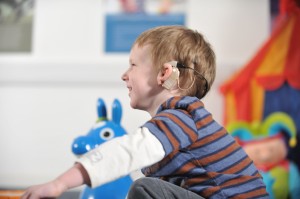Children’s Outreach Service
The Auditory Implant Service provides rehabilitation for your child at your home, your child’s educational setting and at the Implant Centre.
Communication Tips:
- Listening is a learned behaviour. Therefore your child needs to wear their hearing aid/cochlear implant all waking hours.
- Listening is always more difficult in background noise. Reduce unnecessary noise e.g. make sure the TV/music is turned off for part of each day.
- Listening is always more difficult over distance. So get close to your child when talking to them.
- Learning happens best when your child understands the activity and is having fun. Respond to your child’s attempts at communication. This will encourage them to keep trying.
- Your child will understand more if they are attending to you. Get your child’s attention by calling them, or moving so they can see you.
What is Rehabilitation?
Rehabilitation is about helping your child to make the best use of their cochlear implant(s) for listening and communication.
The Outreach team consists of Teachers of the Deaf and Speech and Language Therapists who are all very experienced in working with deaf children and with cochlear implants. The team also includes Clinical Psychologists.
Key Contact
When your child is referred for assessment both a Speech and Language Therapist and a Teacher of the Deaf are assigned to your child. One will be your Key Contact who will work closely with you through the implant process as a link person to:
- Ensure continuity of care.
- To help you understand about auditory development with respect to your child and context.
- Liaise with other professionals involved with your child, and offer training both at the implant centre and locally.
- Give practical recommendations to maximise your child’s communication and listening development.
- Monitor your child’s long term progress, at home, nursery or school.
Where do we work?
We offer support in clinic, at home and at your child’s educational setting. Benefits of home/school visiting include:
- A more familiar place in which your child is likely to communicate more typically.
- Your child is likely to be more attentive and receptive if s/he is not tired after a long journey.
- Sharing information with other professionals involved with your child is easier.
During assessment we will:
- Assess your child’s listening and communication. −− Provide you with clear information.
- Discuss and clarify any issues related to your child and the cochlear implant process.
- Discuss the expected outcomes for your child if they go forward for a cochlear implant.
- Consider any known additional difficulties which may have a bearing on implant use or outcomes.
- Offer an appointment with a Clinical Psychologist to discuss any concerns you may have.
If your child is implanted we will:
- Offer advice and support about how to help your child to listen well.
- Give practical suggestions to you and local services to optimise your child’s use of the implant.
- Visit your child at home and in school to monitor progress.
- Assist in audiology assessments.
- Advise and fit radio aids when appropriate.
- Review progress in relation to the cochlear implant over time. In consultation with yourselves, local teachers and therapists we plan strategies and goals for developing listening and communication and provide training.
- Attend school annual review meetings when appropriate and offer training courses to those supporting your child’s education.
The Clinical Psychologist is available if you have concerns about your child’s behaviour, emotional wellbeing or developmental progress.
The team do not provide regular therapy but support local professionals to do so. Our primary focus is to help your child’s listening development.
What methods do the outreach staff use?
We will support any approach which will benefit your child. Staff believe in helping parents to make an informed choice for their child. As a result not all children who have implants use speech as their primary mode of communication.
Additional optional group support available to children:
We organise social events which enable you and your child to meet other children and adults with implants. Also, courses such as music groups and parenting courses are available.



Leave a Reply